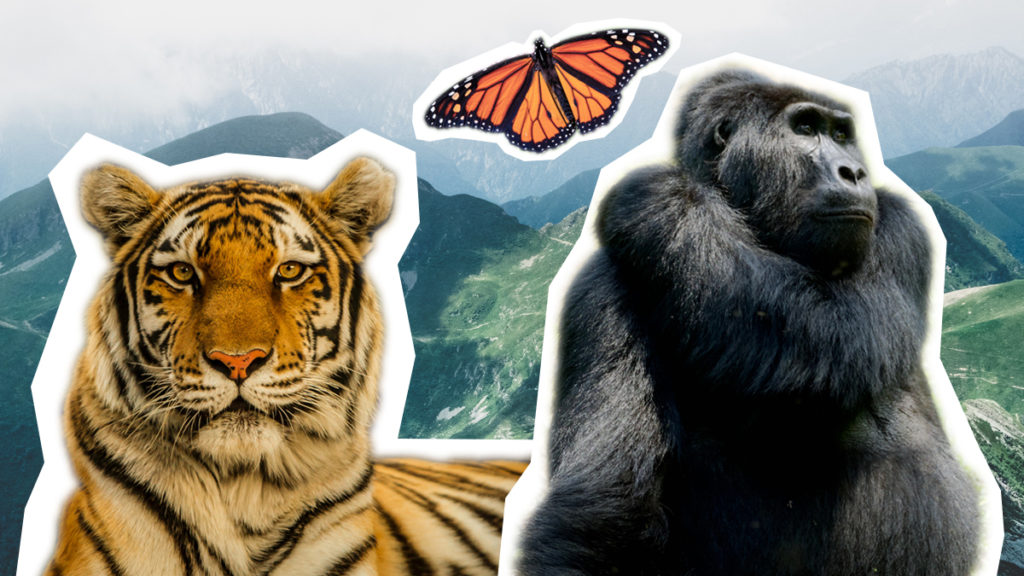Volcanoes are erupting in The Philippines, but on-fire Australia received some welcome rain. The Iran war cries have been called off and The Donald’s military powers are about to be hamstrung by the Senate. Meanwhile, his impeachment trial is starting, and we’re all on Twitter for a front-row seat.
What Could Go Right? Positive news from 2021
And what good we can expect from 2022, including (even) more vaccines
This is our weekly newsletter, What Could Go Right? Sign up here to receive it in your inbox every Thursday at 6am ET. You can read past issues here.
One great thing about 2021? It wasn’t 2020
There seems to be a general air of disappointment around 2021, understandably so, now that Covid-19 has laughed in the face of our holiday plans, Omicron-style. But one thing is for certain: we are not in a Groundhog Day pandemic loop, although it may feel like 2020 again as we trudge through the Omicron wave. Forewarned is forearmed, and while we’re waiting on Omicron answers, we have much, much more data about Covid than at the start of the year. We have all the information we need to make smart, safe decisions. Get boosted. Get tested. (If you can.) Keep this very thorough Vox guide for what to do if you test positive for Covid in the coming weeks handy in your bookmarks. And don’t lose your spirit.
We all want to be done with the pandemic. The pandemic isn’t quite done with us, but we would still take the bet that it is slowly petering out. As our friends at GZERO Media wrote this week in their Signal newsletter: “Last year we looked forward to the arrival of the vaccine to change things. This year we look ahead to 2022 hoping that the current pandemic wave may be the last major one.” Indeed, there is the curiosity that the Omicron wave in South Africa has already peaked. And a study released yesterday found that Omicron patients there, infected between October and November, were 80% less likely to be hospitalized than patients with other Covid variants.The study has not yet been peer-reviewed, though, and it’s impossible to say whether the result is because Omicron causes milder illness or because the area studied has high natural immunity from previous Covid waves.
Here is the difference 2021 made from 2020, and what 2022 should bring. Starting from mid-2020, we’re now at almost nine billion Covid vaccine doses given globally. Bloomberg’s vaccine tracker estimates that we’re four months away from 75% of the world population having received at least one dose. There are 23 Covid vaccines approved for use worldwide and literally hundreds of others in development (click that link for a fantastic vaccine roundup from Nature). Pfizer-BioNTech and Moderna’s boosters are holding their own against Omicron. The United States army is even working on a pan-coronavirus vaccine that could be effective against all variants.
Where would we be right now without these vaccines? Nature reports that their “astonishingly rapid development and deployment has saved at least 750,000 lives in the US and Europe alone—and likely many more globally, although researchers are as yet unwilling to commit to a number.” The Commonwealth Fund, a US-based fund that focuses on healthcare improvement, has estimated what the numbers would have looked like in the absence of any vaccination program at all: in the US, 1.1 million additional deaths and more than 10.3 million additional hospitalizations by November 2021.
Other 2021 biggies and things to look forward to in 2022
Despite pandemic challenges vis a vis prices and materials, a new global energy economy is emerging: renewables. The International Energy Agency expects 2021 to be record-setting for the installation of renewable technology. Their report, from earlier this month, expects a further 60% growth “from 2020 levels to over 4,800 gigawatts—equivalent to the current total global power capacity of fossil fuels and nuclear combined.” Renewable capacity added in the next five years will be double the amount added in the last five. Who is the global leader in all this, by the way? China. (They also eliminated malaria within their borders this year.)
The private sector is now sinking billions into climate technology. This year, according to the climate newsletter Bloomberg Green, we’ll see as much as $50 billion invested to find and accelerate climate solutions. The electric vehicle market, too, is exploding. Ten years ago, electric vehicles accounted for .002% of global sales. In 2021, they account for almost 11%, with particularly feverish interest in Asia.
For even more, Wired put together a nice list of 2021 wins, with one fun item we missed in our own coverage. Humans produced oxygen on another world for the first time in 2021. The National Aeronautics and Space Administration (NASA) is hard at work making Mars researchable, travelable, and one day maybe even livable. In April, an instrument the size of a toaster, sent to the red planet attached to the robot rover Perseverance, not only converted Mars’ unbreathable atmosphere into oxygen, but also created rocket propellant and water from Martian rock and dust (and a little hydrogen).

A technician lowers the toaster-size MOXIE, the Mars Oxygen In-Situ Resource Utilization Experiment, into the Perseverance rover. Fun fact: “MOXIE makes oxygen like a tree does,” according to NASA. “It inhales carbon dioxide and exhales oxygen.” Photo credit: NASA/JPL-Caltech.
And here are two major American fixes that we didn’t see on any roundups. The US has a terrible reputation compared to its peers when it comes to the death penalty. In 2021, though, executions in the US dropped to their lowest levels in three decades. A case backlog from the pandemic might result in a small uptick next year, but the overall trend is still away from capital punishment. These three paragraphs from The Wall Street Journal are worth quoting in full:
The death penalty is increasingly geographically isolated. Four counties in Texas and one in Oklahoma account for more than 20% of executions in the US since the death penalty resumed in the 1970s, according to the Death Penalty Information Center. These counties accounted for more than one-third of the executions in the entire US this year.
Capital punishment isn’t just fading in liberal states but in many conservative places as well. In the spring, Virginia became the first Southern state to repeal the death penalty. The majority of states have now either abolished capital punishment or imposed a moratorium on its use, according to the report.
A push is under way in more conservative states to get rid of the death penalty. The number of Republican sponsors of death penalty repeal bills rose to 36 in 2020 from four in 2000, according to the nonprofit Conservatives Concerned about the Death Penalty.
Workers across the US will be ringing in the new year with a pay raise. According to a new report from the nonprofit National Employment Law Project (NELP), the minimum wage will increase in 21 states and 35 cities and counties by January 1, 2022, with 33 from that count reaching or exceeding $15 per hour. Four more states, as well as several more cities and counties, will follow later in the year.
Before we go
What if we were able to predict the timing and location of killer tornadoes with near perfect accuracy? We already are. Since the 1980s, before Doppler radar was invented, we’ve gone from predicting 50% of tornadoes to 97% of them. “In many ways the tornado warning system—and everything that leads up to it—is one of the most incredible success stories in applied science,” Harold Brooks, a research scientist who studies severe storms, told The New York Times. “We don’t miss violent tornadoes essentially ever now.”
A major tornado that ripped through western Kentucky last week killed 77 people. But overall, we have become much, much better at preventing loss of life, not only through early warnings but also education and building codes. A 1925 tornado, similar in size to the recent one in Kentucky, killed nearly 700 people, the Times piece says.
Below in the links section, Dubai’s government goes paperless, India’s sex workers win rights, and more.
Enjoy the holiday season, and here’s our gift to you: if you’re a Twitter user, give Doomscrolling Reminder Bot a follow. The only thing it tweets are reminders to take a break from doomscrolling.
See you in 2022!
From us: Just because the capitalism we have now is risky and rapacious doesn’t mean that we can’t change it for the better. The Progress Network (TPN) Founder Zachary Karabell comes together with TPN Member Gillian Tett, editor-at-large for the Financial Times (US), to imagine what a more sustainable and human capitalism might look like. Listen to the bonus episode or read the transcript here. The conversation was originally recorded in June.
Progress, Please
(Found good news? Tweet at us @progressntwrk or email.)
Other good stuff in the news
United States:
- Did the pandemic change dads’ roles forever? | The 19th
- Women’s wages are now growing faster than men’s | Intelligencer
- This new tech cuts through rock without grinding into it | Wired
- The White House unveiled a plan to replace every lead pipe in the US | NBC News
- The FDA will permanently allow abortion pills by mail | The New York Times
- The Senate passed the Uyghur Forced Labor Prevention Act, a major step toward holding China accountable for repression in Xinjiang | The Washington Post
International:
- The EU’s top court ruled that same-sex parents and their children must be recognized as a family in all member states | Euronews
- Dubai has become the world’s first paperless government | Gulf News
- Nature’s 10: Ten people who helped shape science in 2021 | Nature
- After banning cinema for decades, Saudi Arabia is making movies | The Economist
- India’s sex workers won benefits from the country’s top court | The New York Times
- 70 is the new 60: we really are aging better | Scientific American
- The “flying doctors” saving lives from the air | BBC
- A huge supply of subterranean water was discovered in Mars’ Grand Canyon | New Atlas
- Wind power has become Spain’s leading energy source for 2021 | El País
- A London-based social enterprise is rewilding the UK, one grasshopper at a time | Wired
TPN Member originals ![]()
- Omicron is the beginning of the end of the pandemic | Yascha Mounk
- “We can’t challenge ageism unless we’re aware of it” | Ashton Applewhite
- What does it take to sustain democracy? | Robert Talisse
- How to save people from drowning in a sea of misinformation | Suzanne Nossel
- How to stay true to liberal values in politics, with the author and academic Michael Ignatieff | Yascha Mounk
- The economy is doing well, even if it feels like a disaster | Zachary Karabell
- How the digital ecosystem strengthens tribal narratives | Robert Wright
- The crucial difference between inflation and unemployment | James Fallows
- The case against “creating jobs” | Matthew Yglesias
- The mRNA Revolution | Diane Francis
Ring out the year with our long list of the week’s progress links.
13 Animals That Made a Comeback in 2021

We’re celebrating 13 animals that came back from the brink in 2021. These species rebounded from endangerment, reappeared after centuries, and defied declarations of extinction. Their success stories show that we are capable of reversing the harms our activity has caused the animal kingdom, with the right focus and energy.
Until Next Time
We will leave you with this Omicron mental image, which you might choose bring to mind whenever you see a picture of a spike protein.👇



[…] From The Wall Street Journal, as quoted by The Progress Network: […]